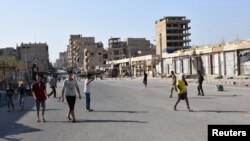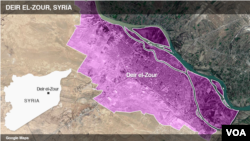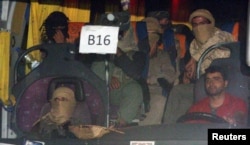The Lebanese Hezbollah group has declared victory in Syria and promised to remake a greater Middle East as the Syrian army and allied Shi’ite militias, supported by Iran and Russia, continue to advance against the Islamic State (IS) and several Syrian rebel groups.
“We are well aware of our command in this battle and our martyrs, our wounded, our families, and our people will change the equations and make history for not only Lebanon but the entire region,” said Sayyed Hassan Nasrallah, leader of Hezbollah, which has sent thousands of fighters to Syria since 2011 to support the government of Bashar al-Assad.
Speaking at a religious gathering held in preparation for the holy Shi’ite ceremony of Ashura, Nasrallah said the opponents of the Assad regime have failed in Syria and are seeking to negotiate for “some gains.”
“We have won the war [in Syria] and what is left are some sporadic battles,” he told the gathering, according to Lebanese media.
Making gains
The Syrian army and allied Shi’ite militias have recently made significant gains against IS in its last Syrian stronghold of Deir el-Zour. Videos published by Hezbollah’s al-Manar website show Hezbollah militants marching in the city alongside the Syrian army and waving Hezbollah’s flags in areas captured from IS.
Elsewhere in Syria, Hezbollah’s support has proved critical for Assad to crush IS militants and other opponents of the regime.
The group has helped the regime troops to capture much of the rebel enclaves in Damascus, Aleppo and Homs. It recently brokered a controversial agreement with IS that allowed hundreds of IS fighters and their families, escorted by the Syrian army, to leave the Syrian-Lebanese border and travel toward eastern Syria.
Since it was established in the 1980s, Hezbollah has mainly portrayed itself as the defender of Lebanon and a challenger of Israel. After the events of the Arab Spring in 2010, however, it shifted its focus toward other countries of the Middle East where its main sponsor, Iran, has been engaged in a fierce competition with Sunni regional powers.
“Hezbollah has metamorphosed from a known homegrown resistance movement into a puppet of Islamic Republic and acts as a proxy of Tehran in the region,” Hessam Dastpish, a political analyst at Salahaddin University in Irbil, told VOA.
“Iran used the situation and fear of IS to bolster its ambition in the region and Hezbollah shadowed Tehran,” Dastpish added.
A regional proxy
Today, in addition to Syria, the group is helping Shi’ite Popular Mobilization forces in Iraq, backing Houthi rebels in Yemen, and has helped organize Liwa Fatemiyoun from Afghanistan.
Seth Frantzman, a researcher at the Rubin Center for Research in International Affairs in Israel, said Hezbollah portrays itself as a defender of minorities in the region, including Christians.
“It uses this to whitewash its role in the Syrian conflict, pretending that it is only fighting IS and al-Qaida even though it is also fighting the opposition groups,” Frantzman told VOA.
He added that the growing influence of the group has inspired Iran to support establishing several similar Shi’ite militias across the region to showcase the Iranian model of governance in the region.
“Iran’s proxies, such as Hezbollah, have not built any civilian infrastructure, universities or anything that supports moderation, democracy and liberal values in the wake of IS.”
Shi’ite crescent
Some experts charge that the empowerment of groups like Hezbollah will help accomplish what is known as “the Shi’ite Crescent” — a project that extends the Iranian sphere of influence from Tehran through Baghdad and Damascus to Beirut and the Mediterranean Sea.
They warn that the growing influence of the Iranian-backed groups can add to the complexity of the conflict in the region, particularly when the interests of local communities diverge with those of Iran.
In places like Yemen, the influence of Hezbollah and Iran has added to those complexities.
“The foreign players have changed the balance in Yemen and took a toll on the people of Yemen to fulfill their regional goals or political ambitions,” Cairo-based Yemeni affairs analyst Maysaa Shuja Aldeen told VOA.
In Iraq, Hezbollah’s decision to transfer hundreds of IS fighters from the Syrian-Lebanese border toward the Iraq border rattled Baghdad last month.
In Syria, opposition to Hezbollah’s robust presence is growing.
“There is no difference between Hezbollah and other foreign forces that are in the country against the Syrians’ will,” Riad Mousa al-Asaad, a commander of the Free Syrian Army, told VOA.
He accused Hezbollah of occupying Syrian territories on the Lebanese border and changing the demography of the area by forcing the Sunni population to flee.






